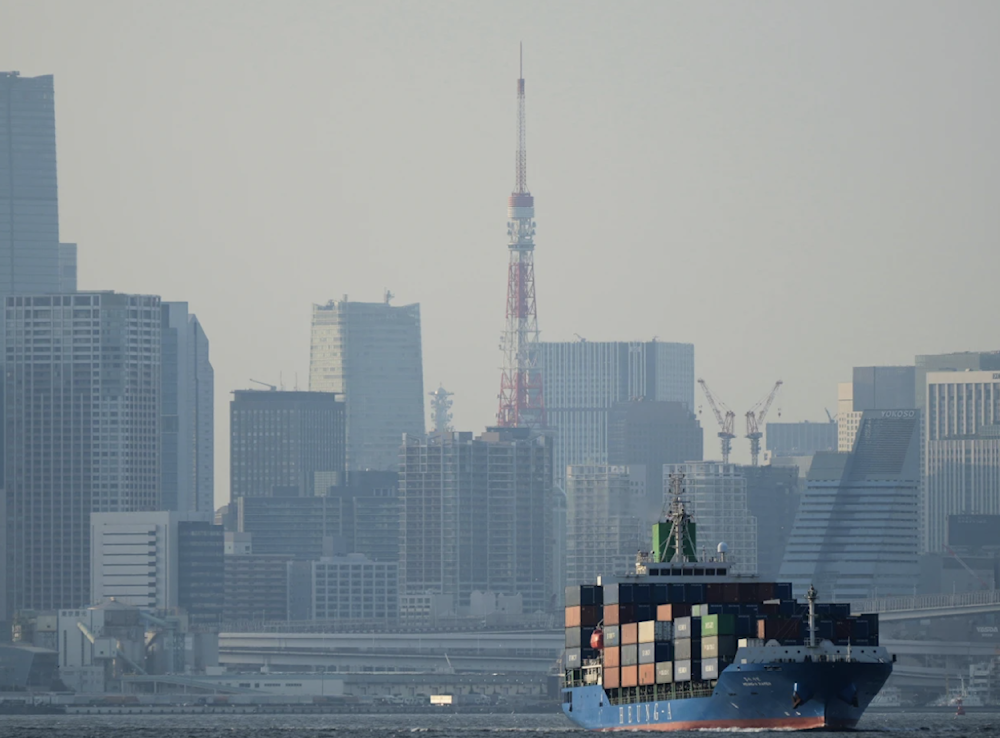US blocks global maritime decarbonisation deal at UN shipping talks
US pressure delays IMO vote on global shipping carbon tax; Trump slams Net Zero Framework as a "scam", threatening sanctions on supporting countries.
-

Tokyo Tower is visible amid tall buildings as a container ship leaves a cargo terminal in Tokyo on April 9, 2025. (AP)
An international agreement to reduce carbon emissions from global shipping was postponed on Friday, following pressure from the United States, which opposes the plan. The International Maritime Organization (IMO), a UN body regulating international shipping, had been expected to formally approve a global emissions pricing system, but instead voted 57 to 49 to delay the decision until next year.
This marks a major setback for the Net Zero Framework (NZF), which aims to impose financial penalties on high-emission ships and encourage investment in cleaner fuels.
The delay follows a campaign led by US President Donald Trump, who has reversed Washington’s climate policy since returning to power in January. On Thursday, Trump posted on his Truth Social platform, calling the global carbon tax on shipping a “scam” and warning that the United States "will NOT stand for this Global Green New Scam Tax on Shipping."
The US withdrew from IMO negotiations in April and has since threatened sanctions, visa restrictions, and port levies against countries that support the NZF.
Divisions emerge between oil and non-oil states
Tensions at the London meetings grew throughout the week, particularly between oil-producing nations and those advocating for stronger climate action. A Russian delegate described the process as “chaos” during Friday’s plenary session.
Russia, along with Saudi Arabia and the United Arab Emirates, voted against the carbon pricing proposal in April, citing risks to economic stability and food security. On Friday, Liberia and Saudi Arabia formally requested a postponement of the vote.
A European Union source told AFP that "many countries have changed their minds under pressure from the US."
Industry leaders demand regulatory clarity
The International Chamber of Shipping, which represents more than 80 percent of the global fleet, expressed disappointment at the delay.
"Industry needs clarity to be able to make the investments needed to decarbonise the maritime sector," said Secretary General Thomas Kazakos in a statement.
IMO Secretary-General Arsenio Dominguez also voiced frustration with the stalled talks, telling delegates: "It doesn't help your organisation, it doesn't help yourself,"
EU and pacific states urge action despite resistance
Despite US opposition, countries including China, Brazil, the European Union, and Britain reaffirmekd support for the emissions framework. Pacific Island nations, which had previously abstained, were expected to back the NZF this time.
The NZF would require ships to progressively cut emissions starting in 2028. Vessels exceeding the limits would be charged, while funds raised would reward low-emission ships and support vulnerable nations facing the effects of climate change.
Shipping accounts for nearly three percent of global greenhouse gas emissions, according to the IMO. If adopted, the framework would be enforced through port inspections and compliance checks, making it difficult for any country, including the US, to avoid the new standards.
The Philippines — the world's largest supplier of seafarers — and Caribbean states with cruise-dependent economies could be especially impacted by any US-imposed visa or port restrictions.

 3 Min Read
3 Min Read








